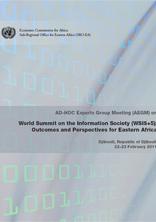World Summit on the Information Society (WSIS+5) - Outcomes and Perspectives for Eastern Africa

Information and Communication Technologies (ICT) are of vital importance for all human societies, and particularly to the African countries that are confronted with multifaceted challenges which range from the most basic needs such as water, health and education, to major problems that threaten Africa in its very foundation. It is an open secret for anyone that at the basis of all knowledge and understanding, it is the “minor information” that serves as the spark that triggers off any action or undertaking: at the level of the school by easy access to universal knowledge but also in the economic area by providing SMI/SME with tools and databases that enable them to more efficiently negotiate their advantages or on the local, regional or even the international market.
The economic importance of the ICT sector and the performance of all other economic sectors contribute to growth and competitiveness. ICTs confer to the digital economy an importance that is higher compared to the economy traditionally operated. Information and Communication Technologies (ICT) can constitute indispensable tools for poverty reduction, stimulation of economic growth and for ensuring the attainment of Millennium Development Goals (MDGs).